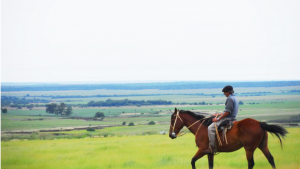Fulbright Fellow, Matias Centeno, examines reshaping rural borders

During 2014, Matias Centeno worked with TASCHA to better understand how different information and communication technology (ICT) tools impacted family farming. Centeno’s research focuses primarily on the role of youth in the complex social transformation of agriculture and the way this transformation manifests itself in different social, economic, and cultural spaces. Centeno led research projects about youth and ICT in the rural areas of his home country, Argentina and studied groups within different cultural contexts in the United States and Europe. Centeno holds a PhD in Social Communication and is a journalist with a degree in Social Communication and a Master’s in Local Development. For the fall of 2021, Centeno will rejoin TASCHA as a Fulbright Fellow and continue his work with a new project called, Reshaping rural borders: youth, ICT and socio-technical implications of COVID-19 pandemic in family farming.
“Seven years ago I had a wonderful experience at TASCHA, collaborating with farmers, agrarian youth, academics and organizations related to agriculture in different regions in Washington State. With the methodological mentoring of Dr. Maria Garrido, we studied new socio-digital dynamics impacting youth in hybrid rural and urban areas, also known as rurban. Now, in the midst of a pandemic, research challenges are heightened. TASCHA is the best place to re-examine the original findings and connect them with our ongoing research in Argentina about the socio-technical implications of COVID-19”, says Centeno.
The work ahead
The agricultural setting is a relevant field to think about contemporary youth, their trajectories, dilemmas and strategies in an interconnected and uncertain world. Family farms produce more than 80% of the world’s food in value terms, confirming family farming’s central importance in world food security today and for future generations (FAO, 2020). Family farms remain a key part of US agriculture, making up 98% of all farms and providing 88% of production. Most of those farms are small and they operate almost half of US farmland (Whitt, 2020).
The COVID-19 pandemic accelerated some transformations and changes that researchers were not expecting to happen for decades to come. The pandemic has highlighted the digital acceleration in daily life and the dematerialization of the economy. This process is expanding gaps that exist within fragile economic and political cycles as well as the inequities in technical shifts. Fueled by the integration of ICT in everyday life, young people are configuring new experiences that go beyond traditional agricultural activity.
Young people are re-imagining historical classifications including rurality, agricultural practices, rural youth and farming culture, among others. Even when the agricultural economic outlook includes some positive scenarios, farming is familiar with the uncertainties and challenges that are growing in the industry. The Reshaping Rural Borders project will focus on the socio-digital and socio-technical dynamics of agrarian young people in Washington State, United States. The research seeks to explore the implications of COVID-19 in family farming. In this context, the project will track the communication modalities of youth in farming and the developments they have drawn from digital technologies.
“We’re excited to better understand the impacts of digital acceleration and its specific challenges for agrarian youth. This work represents a significant opportunity to spotlight the effects of the pandemic in agriculture by focusing on youth use of ICT to navigate the new normal”, says Centeno.
The project team hopes this work will establish relevance for future research opportunities between the US and Argentina, strengthening the global north to global south strategic alliances.
Featured image by Matias Centeno is licensed under CC BY 2.0.


